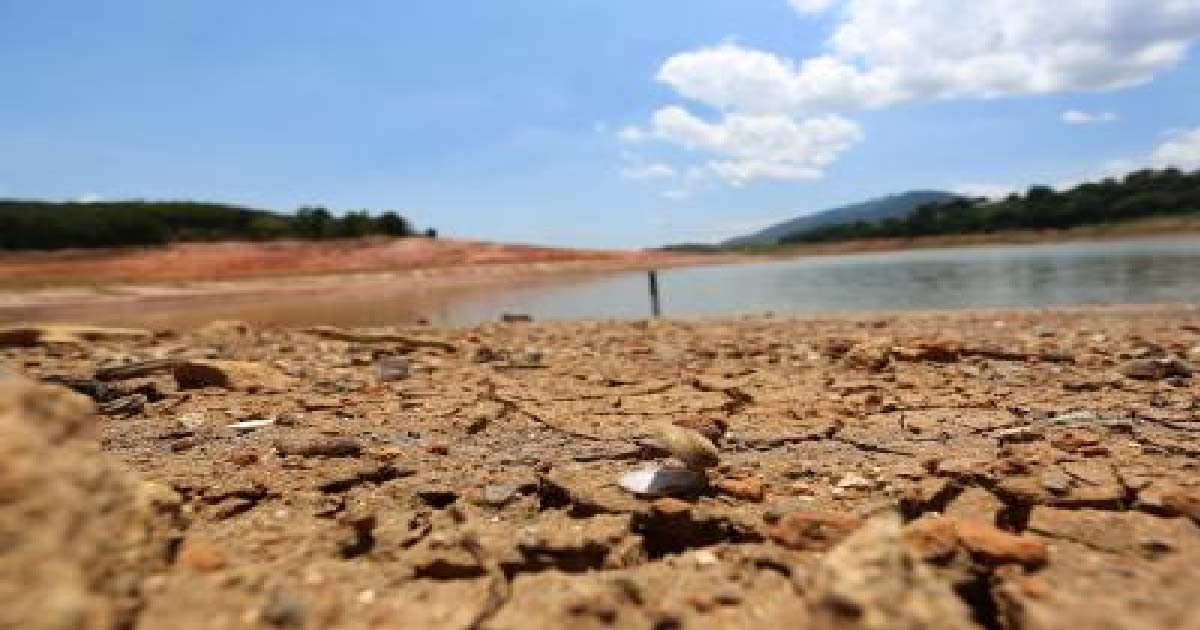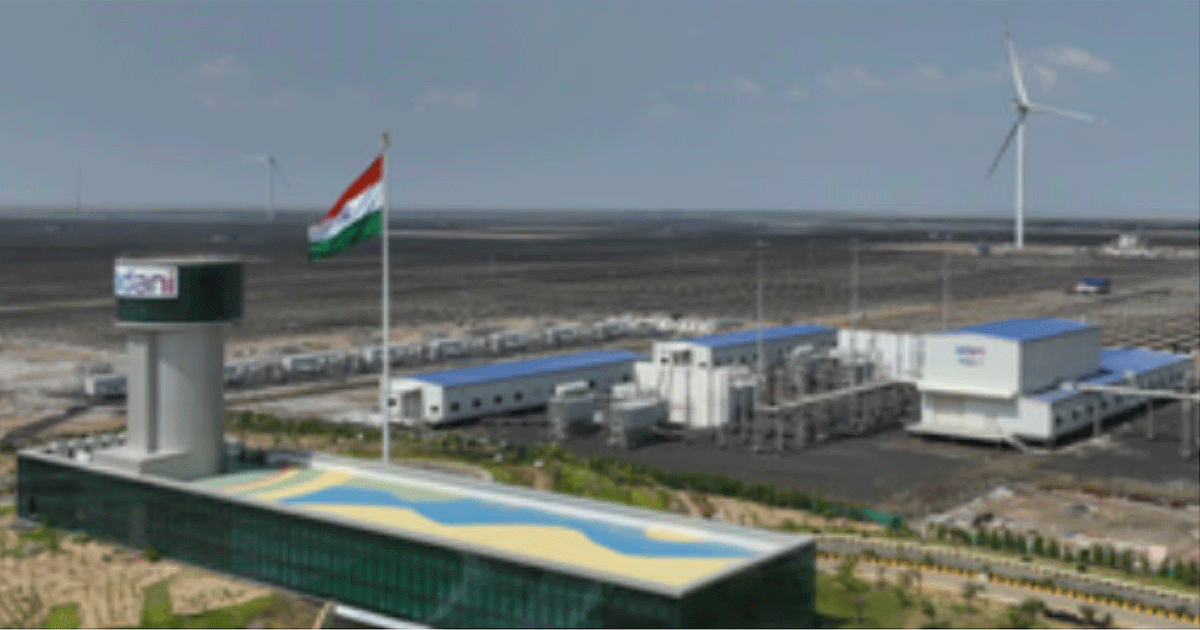National
Gujarat can witness one of the hottest years in 2025: Scientists

Ahmedabad, April 10: As Gujarat grapples with soaring temperatures, Ahmedabad recorded a high of 42°C (108°F) on Thursday, with a predicted forecast similar for the coming days.
Over the past few decades, Gujarat has witnessed a consistent increase in both minimum and maximum temperatures. Scientists warn that 2025 could be one of the hottest years on record if current trends continue.
The IMD’s ‘State-Level Climate Change Trends in India’ report indicates an annual rise of approximately 0.02°C in these temperature metrics. While this increment may seem marginal every year, its cumulative effect over time has led to more frequent and intense heatwaves.
The IMD predicts that the intense heat will persist throughout April and May, with maximum temperatures ranging between 41°C to 45°C (106°F to 113°F) in parts of Gujarat. A slight respite is expected with the onset of the monsoon season in June, although temperatures are still projected to remain above normal during this period.
Experts suggest that several factors contribute to this warming phenomenon. Rapid urbanisation and industrialisation have transformed cities like Ahmedabad and Surat into heat islands, where concrete structures and asphalt surfaces absorb and retain heat, elevating local temperatures.
Additionally, deforestation for agricultural expansion and urban development has diminished the natural cooling effects of vegetation, further exacerbating the heat. Gujarat’s geographical features also play a role. Its extensive coastline along the Arabian Sea means that rising sea temperatures can influence local climate conditions.
“Urbanisation in cities like Ahmedabad and Surat has replaced natural landscapes with heat-trapping concrete, asphalt, and steel. These materials retain heat well into the night, increasing not just daytime but also nighttime temperatures. It’s a classic case of the urban heat island effect,” said a climate scientist at the Gujarat Ecology Commission.
Further, Gujarat’s semi-arid geography makes it more vulnerable to temperature extremes. Unlike forest-rich regions, dry land heats up faster and offers minimal natural cooling. This makes rural populations and agricultural workers especially susceptible to heatstroke and dehydration.
In May 2010, Ahmedabad experienced an extreme heatwave, with temperatures soaring to unprecedented levels. Studies indicate that during this period, there was an estimated 43 per cent increase in all-cause mortality, translating to approximately 1,344 excess deaths compared to similar periods in 2009 and 2011.
More recently, in May 2024, Gujarat recorded 187 cases of heatstroke, with Ahmedabad accounting for 69 of these cases. Notably, 152 of these cases across the state, including 66 in Ahmedabad, were reported in the last ten days of May when average temperatures reached 44.6°C.
In the agricultural sector, increased heat stress adversely affects crop yields, threatening food security and the livelihoods of farmers.
Health-wise, the prevalence of heat-related illnesses has surged. For instance, during a heatwave in 2010, Ahmedabad recorded 76 heatstroke deaths in a single week.
Subsequent analyses revealed an excess of 800 deaths during that period, highlighting the severe impact of extreme heat on public health.
In response to the increasing heat, the Gujarat government has implemented several measures to mitigate the impact on its citizens.
The Gujarat State Disaster Management Authority (GSDMA) has developed action plans for high-risk cities, focusing on early warning systems and public awareness campaigns.
Furthermore, the government has advised residents to take precautions against heat-related illnesses, emphasising the importance of staying hydrated and avoiding direct sun exposure during peak hours. The health impacts of rising temperatures are profound.
Studies have shown a significant increase in heat-related illnesses and mortality during extreme heat events.
For instance, the 2010 heatwave in Ahmedabad was associated with a 41.3 per cent increase in all-cause mortality. To combat this, the Ahmedabad Municipal Corporation has launched heat wave preparation and warning systems aimed at protecting vulnerable populations.
Looking ahead, projections indicate that Gujarat’s mean temperature could rise by up to 5°C by the end of the 21st century.
Business
Adani Green Energy Sales Jump 42% In Q1, Operational RE Capacity Reaches 15.8 GW

Key Highlights:
– Energy sales rose 42 percent YoY to 10,479 million units in Q1 FY26.
– Operational RE capacity reached 15.8 GW, the highest in India.
– EBITDA surged 31 percent to Rs 3,108 crore, backed by new greenfield projects.
Ahmedabad: Adani Green Energy Ltd’s (AGEL) energy sales surged 42 per cent (year-on-year) in the April-June quarter (Q1 FY26) to 10,479 million units, as operational renewable energy (RE) capacity grew 45 per cent to 15.8 GW which continues to be India’s largest, the company said on Monday.
While revenue growth increased by 31 per cent (on-year) to Rs 3,312 crore, EBITDA also went up by 31 per cent to Rs 3,108 crore.
According to the Adani Group company, cash profit surged by 25 per cent (on-year) to Rs 1,744 crore in the quarter.
“During Q1 FY26, we added 1.6 GW of greenfield renewable energy capacity, bringing our total increase to 4.9 GW over the past year — an achievement unmatched in India’s transition toward clean energy,” said Ashish Khanna, CEO of Adani Green Energy.
“Our investments in the massive RE development at Khavda in Gujarat as well as other resource-rich sites are delivering results both in terms of superior operational performance and industry-best EBITDA margins,” he said, adding that the company is on track to achieve its 2030 target of 50 GW RE capacity — with at least 5 GW of hydro pumped storage along with battery storage.
Strong revenue, EBITDA, and cash profit growth are primarily backed by robust greenfield capacity addition, deployment of advanced RE technologies, superior plant performance and deployment of new capacities in resource-rich sites in Khavda (Gujarat) and Rajasthan.
“Further, battery storage is also a key part of our future strategy. We remain committed to supporting national energy transition and security ambitions as well as maintaining our ESG leadership, highlighted by our top rankings in the FTSE Russel ESG assessment and recognition at the Reuters Global Energy Transition Awards 2025,” Khanna noted.
AGEL has consistently generated electricity exceeding the overall annual commitment under the power purchase agreements (PPA). In Q1 FY26, AGEL’s PPA-based electricity generation was 31 per cent of the annual commitment.
The company is developing a massive 30 GW renewable energy plant at Khavda in Gujarat. This is spread over an area of 538 sq km, almost 5 times the city of Paris.
Crime
ED books 29 celebrities for endorsing betting apps

Hyderabad, July 10: The Enforcement Directorate has booked 29 celebrities in Telugu states for endorsing betting apps.
The central agency has filed an ECIR against 29 actors, influencers, and YouTubers for allegedly promoting illegal betting platforms, in violation of the Public Gambling Act, 1867.
The probe, under the Prevention of Money Laundering Act, has been taken up based on five FIRs filed in Telangana and Andhra Pradesh.
Film actors Vijay Deverakonda, Rana Daggubati, Prakash Raj, Nidhi Agarwal, Pranitha Subhash and Manchu Lakshmi, and Ananya Nagella are among those who have been booked by the ED.
The names of TV actors, TV hosts and social media influencers like Sreemukhi, Shyamala, and Varshini Sounderajan, Vasanthi Krishnan, Shoba Shetty, Amrutha Chowdary, Nayani Pavani, Neha Pathan, Pandu, Padhmavathi, Harsha Sai and Bayya Sunny Yadav also figure in the list.
Most of these celebrities were earlier booked by the Hyderabad and Cyberabad Police. FIRs were registered against them at Panjagutta, Miyapur, Cyberabad, Suryapet, and Visakhapatnam police stations.
The ED suspects endorsements of platforms like Junglee Rummy, A23, JeetWin, Parimatch, Lotus365, and others involved laundering of large sums through paid promotions.
The ECIR has been booked under BNS sections 318 (4), 112 r/w 49, Telangana Gaming Act sections 3, 3 (A), 4, IT Act 2000 and 2008 section 66D.
In March, Vijay Deverakonda, Rana Daggubati, Prakash Raj and others were booked by Cyberabad police for allegedly promoting betting apps. They, however, clarified that they are not promoting any illegal app.
While Rana Daggubati and Vijay Devarakonda stated that they endorsed only legally permitted online skill-based games, Prakash Raj said he did not renew a contract to promote an app in 2017 after realising that he should not have done it.
A case against six actors and 19 social media influencers was registered at the Miyapur Police Station of Cyberabad Commissionerate in March.
The police registered the case on a complaint by one Phanidra Sharma, a resident of Miyapur, who stated that he found several celebrities and social media influencers actively promoting illegal betting apps, websites and other platforms. The complainant said promotion of betting apps was causing harm to individuals and society by encouraging this addictive, short-term, risky money-making behaviour, leading to financial distress.
Crime
2002 import-export fraud case: CBI takes custody of Monika Kapoor in US

New Delhi, July 9: The Central Bureau of Investigation (CBI) has taken the custody of Monika Kapoor, an alleged economic offender, in the US and will bring her back to India, ending an over two-decade-long run from the law, officials said on Wednesday.
The development comes after Kapoor’s extradition from the US.
The CBI in a press release said the chase has ended after two decades “with the successful extradition of Fugitive Ms. Monika Kapoor, who is accused in a 2002 Import-Export fraud and was on run since then, from USA.”
According to the information provided by the Central agency, fugitive Monika Kapoor, Prop. of M/s Monika Overseas in conspiracy with her brothers, namely Rajan Khanna and Rajiv Khanna forged export documents viz. Shipping Bills, Invoices and Bank Certificates of Export and Realisation during the year 1998.
She obtained six Replenishment (Rep.) Licenses for the import of duty-free gold worth Rs 2.36 crore.
“In furtherance of the criminal conspiracy, they sold the said Rep. Licenses to M/s Deep Exports, Ahmedabad, on premium. M/s Deep Exports, Ahmedabad utilised the said licenses and imported duty-free gold, which caused a loss to the Government Exchequer to the extent of Rs 1.44 crore during the year 1998,” the press release mentioned.
The CBI, on the completion of the investigation, filed a charge sheet on March 31, 2004, against Monika Kapoor, Rajan Khanna, and Rajeev Khanna under sections 120-B r/w 420, 467, 468 and 471 of the IPC.
The Chief Metropolitan Magistrate, District Court Saket, New Delhi, vide order dated December 20, 2017, had convicted Rajan Khanna and Rajeev Khanna.
The CBI said the accused, Monika Kapoor, did not join the investigation and trial; she was declared a proclaimed offender by the trial court on February 13, 2006. The Ld. Trial Court had issued an open non-bailable warrant of arrest on April 26, 2010, and a Red Corner Notice was also issued against her.
A request for extradition was sent by the CBI on October 19, 2010, to the US authorities. Following intense coordination with authorities in the US, a CBI team travelled to the country to take custody of the fugitive.
This extradition marks a major breakthrough in the pursuit of justice and reiterates CBI’s commitment to bringing fugitives to face the law in India, irrespective of international boundaries.
The CBI team is returning to India with the fugitive. Monika Kapoor is being produced before the concerned court and will now face the trial.
The press release said that the CBI remains steadfast in its mission to combat economic crimes and will continue to pursue all legal avenues to ensure that the fugitives are brought to justice.
-

 Crime3 years ago
Crime3 years agoClass 10 student jumps to death in Jaipur
-

 Maharashtra1 year ago
Maharashtra1 year agoMumbai Local Train Update: Central Railway’s New Timetable Comes Into Effect; Check Full List Of Revised Timings & Stations
-

 Maharashtra1 year ago
Maharashtra1 year agoMumbai To Go Toll-Free Tonight! Maharashtra Govt Announces Complete Toll Waiver For Light Motor Vehicles At All 5 Entry Points Of City
-

 Maharashtra1 year ago
Maharashtra1 year agoFalse photo of Imtiaz Jaleel’s rally, exposing the fooling conspiracy
-

 National News1 year ago
National News1 year agoMinistry of Railways rolls out Special Drive 4.0 with focus on digitisation, cleanliness, inclusiveness and grievance redressal
-

 Maharashtra1 year ago
Maharashtra1 year agoMaharashtra Elections 2024: Mumbai Metro & BEST Services Extended Till Midnight On Voting Day
-

 National News1 year ago
National News1 year agoJ&K: 4 Jawans Killed, 28 Injured After Bus Carrying BSF Personnel For Poll Duty Falls Into Gorge In Budgam; Terrifying Visuals Surface
-

 Crime1 year ago
Crime1 year agoBaba Siddique Murder: Mumbai Police Unable To Get Lawrence Bishnoi Custody Due To Home Ministry Order, Says Report












